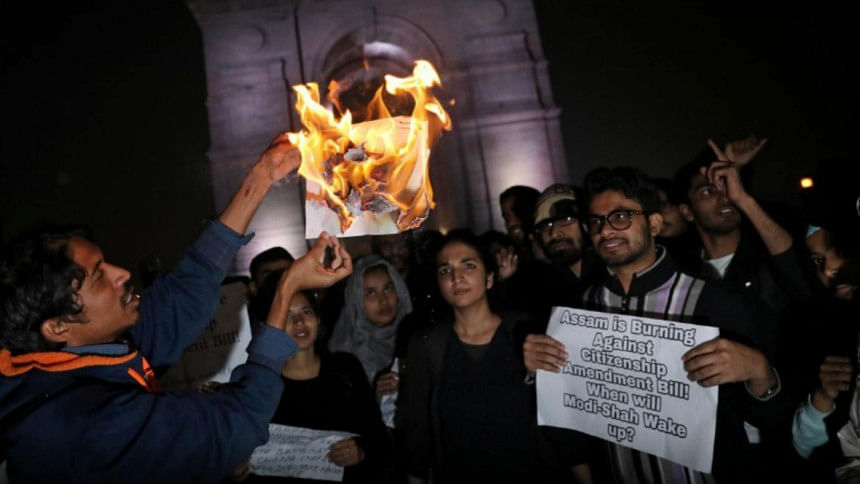A little more than just an ‘internal’ issue?

The controversial Citizenship Amendment Bill 2019 (CAB) has been finally passed through both the lower and upper houses of the Indian Parliament this week amidst protests and questions being raised regarding its constitutional validity. What is unfortunate for Bangladesh is that the very foundation of this amendment bill had blatantly endorsed the so-called religious persecution of Hindu minority community in Bangladesh. What is more unfortunate is that Bangladesh almost ignored the issue on the excuse of it being simply an "internal" matter of India.
Time and again BJP leaders including the current Home Minister Amit Shah had expressed the desire to remove the "infiltrators" allegedly coming from Bangladesh—the consequence of which was the NRC process completed in utter disregard of international law norms and standards. The CAB is now thought to be yet another political move designed to protect the Hindu inhabitants in Assam who were denied citizenship under the NRC, thereby singling out the Muslim inhabitants. The CAB was introduced to amend the Indian Citizenship Act of 1955 declaring that persons belonging to specific minority communities, namely Hindus, Sikhs, Buddhists, Jains, Parsees and Christians from three specific countries namely, Afghanistan, Bangladesh and Pakistan will no longer be treated as illegal migrants and shall be eligible for Indian citizenship.
In relation to Bangladesh, BJP's political narratives prior to NRC were more along the lines of deportation of illegal migrants to Bangladesh. Contrarily, in the context of CAB, the narratives now are more along the lines of "protecting" the persecuted Hindu minorities from Bangladesh. Although during the Lok Sabha debate on the Bill, Amit Shah had reportedly expressed his gratitude and thankfully so, to Bangabandhu Sheikh Mujibur Rahman as there had been no atrocity against the Hindu minority during his regime, his assertion regarding continuance of the persecution of Hindu minority community by later political regimes were quite clearly spoken out.
Introducing the Bill in the lower house, Shah had been quoted saying, "In Afghanistan, Pakistan and Bangladesh, Hindus, Sikhs, Buddhists, Christians, Parsees and Jains have been discriminated against. So, this bill will give these persecuted people citizenships." Shah said the Citizenship Bill will give relief to those who have been living a "painful life" after facing persecution in neighboring countries and also pointed out how the religious minority population in Bangladesh has come down from 22 percent in 1947 to seven percent in 2011.
Such assumptions of continuing religious persecution in Bangladesh is unfortunate, especially because Bangladesh was born due to the very reason that it defied the notion of political divisions based on religion. No denial of the fact that there had been incidents of deprivations and rights violations against minority communities in Bangladesh. However, considering those incidents as "religious persecution" justifying awarding of citizenship under a law, essentially indicates that the threshold had reached such level that it would lead an entire community to consider taking refuge across borders—an assumption that at no point of time can be said to be true for Bangladeshi religious minority communities.
There had also been academics and researchers coming up with decreasing statistics of religious minority in Bangladesh as quoted by the Indian Home Minister. But such questions were raised and analysed for the very reason that Bangladesh identifies itself with the religious and cultural pluralism and the reported decrease in the number of religious minorities is to caution the political leadership to take timely steps to address it. Neither it can be said that the decreasing number is only due to the religious persecution of the Hindu community as there can be many other reasons and theories for population migration; nor it can be said that the Hindu population from Bangladesh had migrated only to one country, i.e. India. Thus, the very basis of BJP's stance on why Bangladesh is to fall within the same classification with countries like Pakistan and Afghanistan for the purpose of CAB is clearly flawed.
Not only that the BJP leaders had debated on this issue of religious persecution in Bangladesh in the Parliament and elsewhere; this was also clearly stated in the Statement of Objects and Reasons (SoP) in the CAB itself. The SoP states that,
"The constitutions of Pakistan, Afghanistan and Bangladesh provide for a specific state religion. As a result, many persons belonging to Hindu, Sikh, Buddhist, Jain, Parsi and Christian communities have faced persecution on grounds of religion in those countries. Some of them also have fears about such persecution in their day-to-day life where right to practice, profess and propagate their religion has been obstructed and restricted. Many such persons have fled to India to seek shelter and continued to stay in India even if their travel documents have expired or they have incomplete or no documents."
In the Lok Sabha, Amit Shah had expressly linked the BNP with religious persecution in Bangladesh during its regime, especially in 2001. However, the SoP has clearly generalised continuance of religious persecution in all three countries, irrespective of any regime or time period; keeping Bangladesh, one of its friendliest neighbours, in the same category with Pakistan and Afghanistan where religious extremism and consequent persecution is known to be high.
Naturally, the narrative built around the context of the CAB is mostly about whether such classification of persecuted migrants is reasonable or not from the constitutional perspective; and is not so much about whether there is actual religious persecution happening in those countries leading to illegal migration in India. For Bangladesh, this narrative impliedly endorsing the assumption that religious minorities are being persecuted in Bangladesh, prejudices its inherent character of a secular state. It is at this juncture that the matter no more remains as "internal" to India, and demands Bangladesh to show its clear defiance against such faulty assumptions.
Taslima Yasmin teaches at Department of Law, University of Dhaka. Email: [email protected]

 For all latest news, follow The Daily Star's Google News channel.
For all latest news, follow The Daily Star's Google News channel. 



Comments